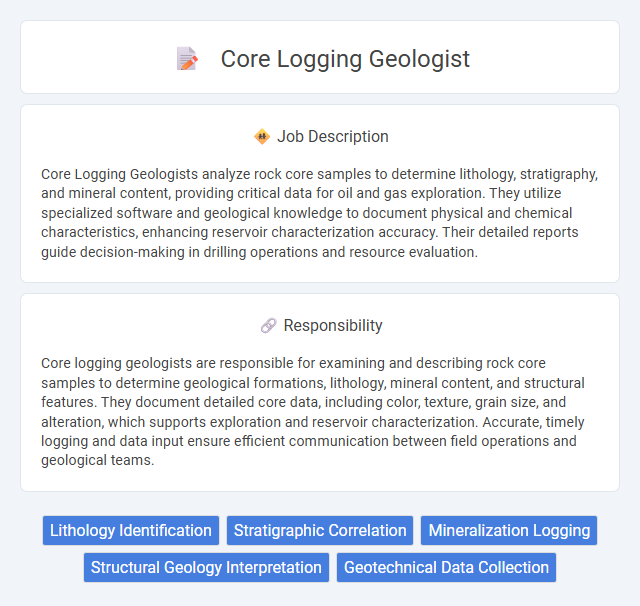
Core Logging Geologists analyze rock core samples to determine lithology, stratigraphy, and mineral content, providing critical data for oil and gas exploration. They utilize specialized software and geological knowledge to document physical and chemical characteristics, enhancing reservoir characterization accuracy. Their detailed reports guide decision-making in drilling operations and resource evaluation.
Core logging geologists are likely best suited for individuals with strong observational skills and a keen eye for detail, as the job demands careful analysis of rock samples in varying environments. Those who excel in methodical, patient work and can tolerate physically demanding conditions such as remote field sites and exposure to outdoor elements will probably find this role more compatible with their strengths. Candidates uncomfortable with long hours in isolated locations or repetitive tasks may face challenges adapting to the core logging geologist position.
Qualification
Core Logging Geologists require a bachelor's degree in geology, earth sciences, or related fields, with specialized training in core analysis and rock characterization. Proficiency in identifying lithology, mineralogy, and structural features through detailed core descriptions is essential. Strong knowledge of geology software, attention to detail, and experience in field sampling techniques enhance qualification for this role.
Responsibility
Core logging geologists are responsible for examining and describing rock core samples to determine geological formations, lithology, mineral content, and structural features. They document detailed core data, including color, texture, grain size, and alteration, which supports exploration and reservoir characterization. Accurate, timely logging and data input ensure efficient communication between field operations and geological teams.
Benefit
Core logging geologists may benefit from enhanced career prospects due to their expertise in analyzing subsurface geological formations, which is critical for resource exploration and extraction. Their skills likely increase the probability of being involved in multidisciplinary projects, offering opportunities for professional growth and specialization. Working as a core logging geologist could also provide competitive compensation and exposure to advanced geological technologies, improving job satisfaction and long-term employment stability.
Challenge
Core Logging Geologist roles likely involve the challenge of accurately interpreting rock samples under varying field conditions, which can significantly impact data quality. The position probably demands keen attention to detail and strong analytical skills to identify mineral compositions and geological features from core samples. Managing time efficiently and adapting to remote or harsh environments may also be common challenges in this job.
Career Advancement
A Core Logging Geologist plays a critical role in analyzing subsurface rock samples to inform exploration and production strategies in the oil and gas industry. Proficiency in core description, mineral identification, and data interpretation enhances opportunities for advancement to senior geologist, project manager, or reservoir specialist roles. Mastery of industry software and strong analytical skills accelerate career growth and leadership potential within geological and energy sectors.
Key Terms
Lithology Identification
Core Logging Geologists specialize in lithology identification by examining rock core samples to determine mineral composition, grain size, texture, and stratification. They document lithological variations critical for interpreting subsurface geology, aiding resource exploration and reservoir characterization. Accurate lithology data ensures better decision-making in drilling and production strategies within petroleum and mining industries.
Stratigraphic Correlation
Core logging geologists specialize in detailed examination and documentation of rock cores to interpret subsurface geology. Stratigraphic correlation is a key responsibility, involving the comparison of rock layers across different locations to establish chronological relationships and depositional environments. This process aids in constructing accurate geological models essential for hydrocarbon exploration and reservoir characterization.
Mineralization Logging
A Core Logging Geologist specializing in mineralization logging meticulously examines drill core samples to identify and document mineral content, distribution, and geological features essential for resource estimation. Their detailed logs include descriptions of lithology, alteration, veining, and mineralization types, providing critical data for exploration and mining decision-making. Accurate mineralization logging enhances the understanding of ore body geometry, grade continuity, and structural controls, optimizing mine planning and economic evaluation.
Structural Geology Interpretation
Core logging geologists specializing in structural geology interpretation analyze rock cores to identify deformation features such as faults, folds, and fractures. They assess structural orientations, measure planes of weakness, and interpret stress fields to provide insights into subsurface geology and guide exploration or production activities. Their detailed structural analysis supports reservoir characterization, drill planning, and risk assessment in hydrocarbon and mineral exploration projects.
Geotechnical Data Collection
Core Logging Geologists specialize in the detailed examination and documentation of rock cores extracted during drilling operations, providing critical geotechnical data essential for subsurface characterization. Their expertise in identifying lithology, mineral content, and structural features enables accurate interpretation of geological formations, which directly supports resource evaluation and engineering design. Precise core logging enhances the quality of geotechnical datasets, facilitating risk assessment and decision-making in mining, oil and gas, and environmental projects.
 kuljobs.com
kuljobs.com